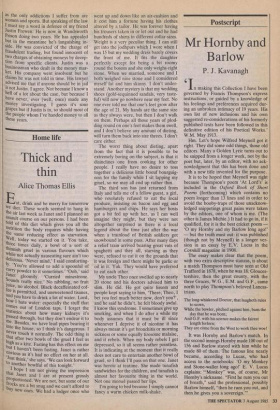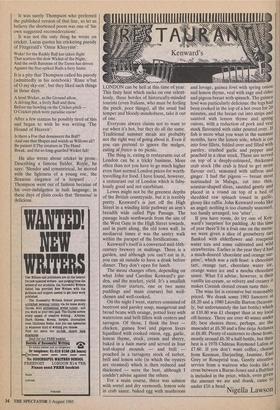Postscript
Mr Hornby and Barlow
P. J. Kavanagh
n making this Collection I have been governed by Francis Thompson's express instructions, or guided by a knowledge of his feelings and preferences acquired dur- ing an unbroken intimacy of 19 years. His own list of new inclusions and his own suggested re-considerations of his formerly published texts have been followed in this definitive edition of his Poetical Works.' W.M. May 1913.
Hm. Let's hope Wilfred Meynell got it right. They did some odd things, those old editors. Many a Golden Lyric turns out to be snipped from a longer work, not by the poet but, later, by an editor, with no ack- nowledgment that this has been done and with a new title invented for the purpose.
It is to be hoped that Meynell was right because Thompson's poem 'At Lord's' is included in the Oxford Book of Short Poems (forthcoming) which contains no poem longer than 13 lines and in order to avoid the booby-traps of those unacknow- ledged snippetings great pains were taken by the editors, one of whom is me. (The other is James Michie.) It had to go in, if it qualified, for it is the best cricket poem — '0 my Hornby and my Barlow long ago!' — but the truth must out: it was published (though not by Meynell) in a longer ver- sion in an essay by E.V. Lucas in the Cornhill magazine in 1908.
The essay makes clear that the poem, with two extra descriptive stanzas, is about a match Thompson must have seen at Old Trafford in 1878, when he was 18. Glouces- tershire, then the great county, with the three Graces, W.G., E.M. and G.F., came north to play Thompson's beloved Lancas- trians.
The long-whiskered Doctor, that laugheth rules to scorn,
While the bowler, pitched against him, bans the day that he was born; And G.F. with his science makes the fairest length forlorn; They are come from the West to work thee woe!
It was Hornby and Barlow's match. In the second innings Hornby made 100 out of 156 and Barlow stayed with him while he made 80 of them. The famous line nearly became, according to Lucas, who had access to the notebooks: `0 my Monkey and Stone-waller long ago!' E. V. Lucas explains: "Monkey" was, of course, Mr Hornby's nickname. "First he runs you out of breath," said the professional, possibly Barlow himself, "then he runs you out, and then he gives you a sovereign." It was surely Thompson who preferred the published version of that line, so let us believe the shortened poem was one of 'his own suggested reconsiderations'.
It was not the only thing he wrote on cricket. Lucas quotes his cricketing parody of Fitzgerald's 'Omar Khayyam':
Wake! for the Ruddy Ball has taken flight That scatters the slow Wicket of the Night; And the swift Batsman of the Dawn has driven Against the Star-spiked Rails a fiery Smite.
It is a pity that Thompson called his parody (admittedly in his notebook) 'Rime o'bat of 0 my sky-em', but they liked such things in those days.
A level Wicket, as the Ground allow, A driving Bat, a lively Ball and thou Before me bowling on the Cricket-pitch — 0 Cricket-pitch were paradise enow!
After a few stanzas he possibly tired of this and began to wish he was writing 'The Hound of Heaven':
Is there a Foe that domineers the Ball? And one that Shapes and wields us Willows all? Be patient if Thy creature in Thy Hand Break, and the so-long-guarded Wicket fall!
He also wrote about cricket in prose. Describing a famous fielder, Royle, he says: 'Slender and symmetrical, he moved with the lightness of a young roe, the flexuous elegance of a leopard . . . Thompson went out of fashion because of • his over-indulgence in lush language; in these days of plain cooks that 'flexuous' is delicious.











































 Previous page
Previous page